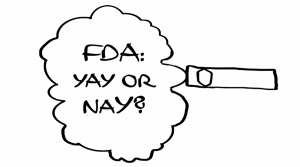December 18, 2018
Vaping, and most notably JUULing, has become an epidemic among the young people of the United States. The CDC has reported that vaping by high schoolers has risen by 78 percent in the last year, along with a 48 percent increase in junior high students.
One problem with JUULing is that scientists and doctors don’t know a lot about their long-term effects because it is a very new trend. Scientists didn’t discover the negative effects of smoking cigarettes until the 1950s when multiple cases of the once-rare lung cancer started appearing in patients more frequently. The oldest cigarette company in the US, Lorillard, was founded in 1760. During the 190 years between 1760 and 1950, scientists did not know about the negative effects of smoking. Who knows how long it will take for us to find all of the diseases and effects caused by vaping? Granted, this generation has much more advanced technology than it did before the 1950s, but it could still take many years before the dangers of vaping are fully discovered. Although the research on the health effects of vaping are limited to the handful of years vapes have been popular, the Penn State Health Milton S. Hershey Medical Center has already seen some side effects including, increased heart rate and blood pressure, lung disease, chronic bronchitis, and insulin resistance, which can lead to type 2 diabetes. The American Cancer Society has also found evidence that nicotine harms the brain development of teens.
Another risk associated with JUULing is that it is highly addictive. According to the National Center for Health Research, a JUUL pods solution contains 5 percent nicotine, the same percent in a pack of cigarettes, while other devices use around 2.4 percent. Because vaping has shown to be a possible gateway to smoking cigarettes for teens, and both have proven to be addictive, experts are concerned that the increasing popularity of vaping could reverse the longstanding US decline in smoking cigarettes. In fact, the American Cancer Society has already reported that teens who vape are also more likely to use regular cigarettes or other tobacco products.
In addition, JUUL pods contain nicotine salts as opposed to the much more commonly used chemically-altered nicotine base. Nicotine salts are absorbed by your body more quickly than the nicotine base used by other vape products, making the effects both come and go much faster. This means that the person vaping will have the desire to vape more and more often, further ensuring that they become addicted.
The device was originally designed for people who smoked cigarettes and were looking for safer and healthier alternatives to cigarettes and then eventually stopping the intake of nicotine altogether. Just because vape products are believed to be safer and healthier than cigarettes at this time of limited research on lasting effects, that does not mean that they are safe nor healthy generally.
Another contributing factor that gets teens hooked on JUULing are the pod flavors. Pods include flavors like fruit, creme, and cucumber. This is the main reason for the FDA’s ban on flavored JUUL pods. Teens are more drawn to appealing flavors like fruit and creme, as opposed to tobacco flavors. The FDA is banning these teen-friendly flavors (leaving flavors like tobacco, menthol, and mint exempt for adults who use it to curb their cigarette addiction) in many retail locations and manufacturers’ online stores that are accessible to minors in order to reduce teen vaping. Additional age-verification requirements within online stores are also planned to reduce this epidemic.
It has been found that the more teens like a flavor, the more they will vape it. For adults, this has not been proven to be true, thus making these restrictions more likely to impact the teens’ usage of these products, while leaving adults who use it to get off of cigarette addiction mostly unaffected.
All of this follows an action by the FDA in September of this year, in which they issued more than 1,300 warning letters and fines to retailers who illegally sold e-cigarette products to minors, the majority of which were to blu, JUUL, Logic, MarkTen XL, and Vuse.
The FDA is doing the right thing in trying to minimize the issue of teen vaping. If they recognized the epidemic and did not take action to try and decrease it, we would have to ask ourselves if the FDA is worthy of our trust in protecting our health and the health of our fellow Americans.















































